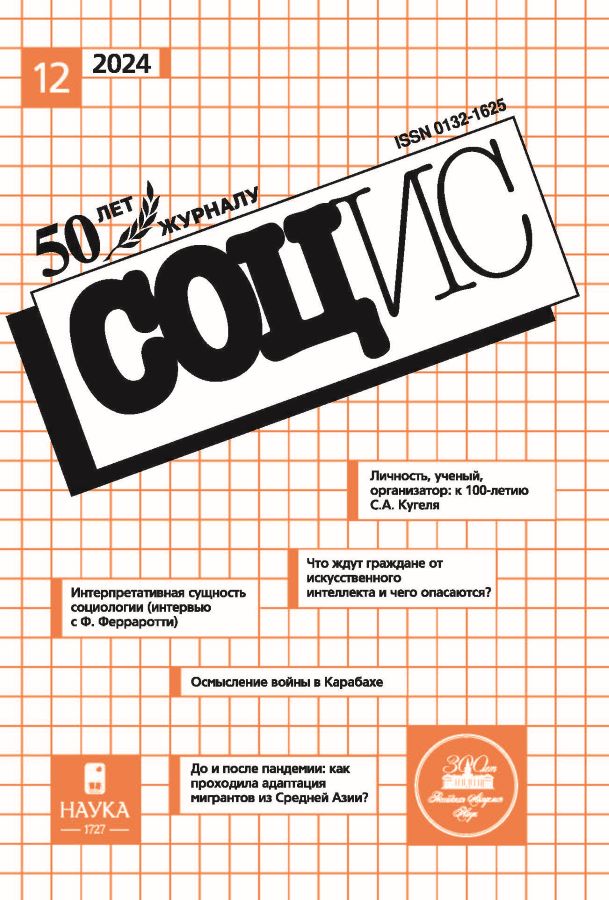Educational and labor migrants from post-Soviet countries: adaptation in Russian society and integration attitudes
- Authors: Endryushko A.A.1
-
Affiliations:
- Institute of Sociology of the FCTAS RAS
- Issue: No 12 (2024)
- Pages: 60-73
- Section: DEMOGRAPHY. MIGRATIONS
- URL: https://ruspoj.com/0132-1625/article/view/683571
- DOI: https://doi.org/10.31857/S0132162524120069
- ID: 683571
Cite item
Abstract
The article offers a comparative analysis of adaptation in Russian society and integration attitudes of two external migrants groups: educational and young working (aged 16–30). Based on the three (2017, 2020, 2023) sociological surveys data of foreign citizens from post-Soviet states, the author examines socio-economic and socio-cultural aspects of adaptation in Russian society of educational and labor migrants comparing their integration attitudes, which imply not only the desire to stay living in Russia, but also the search for common ground between their native culture and the culture of the host society. It is shown that according to a number of indicators (the main being a good knowledge of the Russian language), educational migrants adapt better to the host society than working foreign youth. They also have longer-term plans in Russia, and their intentions go beyond superficial adaptation. At the same time, having social capital, they are more demanding for the social environment that surrounds them in the new society. Their plans may be more flexible and situational than those of labor migrants, including reorientation towards other countries.
Full Text
About the authors
Anna A. Endryushko
Institute of Sociology of the FCTAS RAS
Author for correspondence.
Email: anna.endryushko@mail.ru
Cand. Sci. (Sociol.), Research Fellow
Russian Federation, MoscowReferences
- Demintseva E. B. (2016) Educational Trajectories of Youth from the CIS Countries in Moscow. Sociologicheskie issledovaniya [Sociological Studies]. No. 9: 82–87. (In Russ.)
- Denisenko M. B., Mukomel V. I. (2020) Labor Migration in Russia During the Coronavirus Pandemic. Demograficheskoe obozrenie [Demographic Review]. No. 3(7): 87–107. doi: 10.17323/demreview.v7i3.11637. (In Russ.)
- Gavrilov K. A., Gradirovskij S. N., Pis’mennaya E.E., Ryazancev S. V., Yacenko E. B. (2012) Educational Migration from the CIS and Baltic Countries: Potential and Prospects for Russia. Ed. by K. A. Gavrilov, E. B. Yacenko. Moscow: Fond Nasledie Evrazii. (In Russ.)
- Iskineeva F. F., Ozerova K. A. (2017) The International Nature of Modern education: Foreign Students’ Adaptation to Russian Universities. Vestnik instituta sotziologii [Bulletin of the Institute of Sociology]. No. 1(8): 35–54. doi: 10.19181/vis.2017.20.1.444. (In Russ.)
- Khoroshikh V. V., Logacheva E. A. (2021) Career Plans of Foreign Students Studying in Russia. Gercenovskie chteniya: psihologicheskie issledovaniya v obrazovanii [Herzen Readings: Psychological Research in Education]. Iss. 4: 241–250. doi: 10.33910/herzenpsyconf-2021-4-29. (In Russ.)
- Kong L. (2013) Balancing Spirituality and Secularism, Globalism and Nationalism: The Geographies of Identity, Integration and Citizenship in Schools. Journal of Cultural Geography. No. 1(30): 276–307. doi: 10.1080/08873631.2013.834120.
- Krasnoshchechenko I. P., Kovdyuk D. P. (2015) Social and Psychological Adaptation of Migrant Students and Labor Migrants. Mezhdunarodnyj nauchno-issledovatel’skij zhurnal. [International research journal]. No. 8–5 (39): 38–41.
- Lebedeva T. V. (2020) The Impact of International Educational Migration on the Development of the Modern Higher Education System in the Russian Federation. Vektory blagopoluchiya: ekonomika i socium [Vectors of Well-Being: Economy and Society]. No. 4(47): 23–39. doi: 10.18799/26584956/2022/4/1345. (In Russ.)
- Mukomel V. I. (2016) Adaptation and Integration of Migrants: Methodological Approaches to Assessing the Effectiveness and the Role of the Host Society. In: Gorshkov M. K. (ed) Russia under reform: yearbook. Institute of Sociology of the Russian Academy of Sciences. Moscow: Novyj hronograf: 414–416. (In Russ.)
- Poletaev D. V. (2012) Educational Migration to Russia: Existing Practices and Possible Prospects. Nauchnye trudy: Institut narodnohozyajstvennogo prognozirovaniya RAN [Scientific works: Institute of Economic Forecasting of the Russian Academy of Sciences]. No. 10: 390–406. (In Russ.)
- Poletaev D. V., Dementeva S. V., Zurabishvili T. Z. (2014) Potential of Educational Migration to Professional Educational Organizations in the Context of the New Migration Policy. Izvestiya Tomskogo politekhnicheskogo universiteta. Inzhiniring georesursov [Bulletin of Tomsk Polytechnic University. Georesources engineering]. No. 6(324): 118–125. (In Russ.)
- Rocheva А. L., Varshaver E. A. (2020) Migration Intentions of Youth with and without Migrant Backgrounds: a Russian Case. Monitoring obshchestvennogo mneniya: ekonomicheskie i social’nye peremeny [Monitoring of Public Opinion: Economic and Social Changes]. No. 3: 295–334. DOI: 10.14515/ monitoring.2020.3.1632. (In Russ.)
- Ryazantsev S. V., Ochirova G. N. (2021) Transformation of International Educational Migration During the COVID-19 Pandemic. Social’noe prostranstvo [Social area]. No. 4(7). doi: 10.15838/sa.2021.4.31.3. (In Russ.)
- Shitova N. B. (2020) Educational Migration in Russia: Conceptual Issues of Legal Regulation. Zhurnal rossijskogo prava [Journal of Russian Law]. No. 7: 98–111. doi: 10.12737/jrl.2020.083. (In Russ.)
- Skorobogatova V. I. (2021) Legal Regulation Of Foreign Students And Graduates Employment In Russia and Abroad. Vestnik Saratovskoj gosudarstvennoj yuridicheskoj akademii [Bulletin of the Saratov State Law Academy]. No. 1(138): 246–255. doi: 10.24412/2227-7315-2021-1-246-255. (In Russ.)
- Taradina L. D., Shlentova A. E., Ivashkevich A. A. (2021) Transformation of the Academic Attractiveness of Countries in the Context of a Pandemic. Universitetskoe upravlenie: praktika i analiz [University management: practice and analysis]. No. 1(25): 117–130. doi: 10.15826/umpa.2021.01.009. (In Russ.)
Supplementary files










